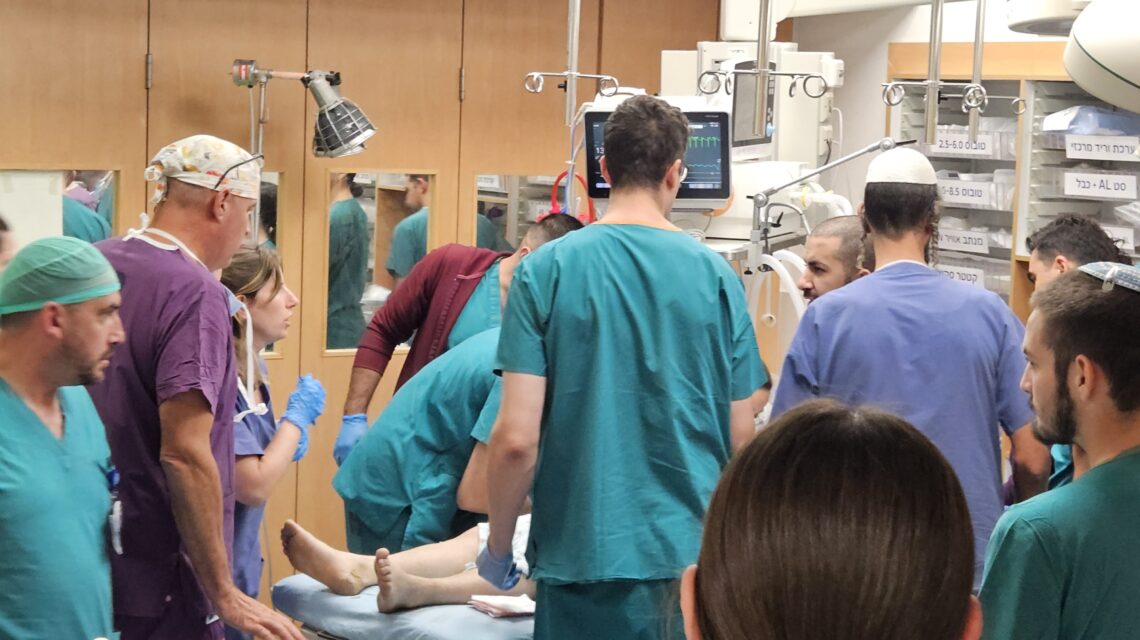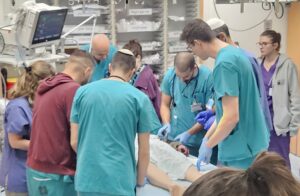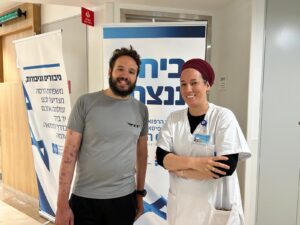
During the months of the war, the nurses at the Gandel Rehabilitation Center at Hadassah play an important role in the recovery of the wounded soldiers by providing medical care, accompaniment, and round-the-clock emotional support. Sarit, deputy head nurse at the rehabilitation center, has treated dozens of wounded since the beginning of the war, each of whom, in their own way, strengthened her by demonstrating incredible strength in their coping mechanisms and a fierce desire to return to the life they knew before the injury.
“Just like on the battlefield, they continue to fight for their lives even in the challenging and intensive rehabilitation process.”
Aharon, a soldier who entered her heart and changed her approach to life, speaks of Sarit’s unwavering dedication: “In such an intensive rehabilitation process, you need with you the person who will believe in you no matter what happens, and Sarit was that person; she was always there by my side, showing a level of commitment that was truly inspiring.”
The role of nurses in rehabilitation is a key factor in accompanying and nurturing patients after they have experienced complex events such as crises, accidents, or injuries. After the acute and life-saving stage, the wounded are at the beginning of their return to routine life in daily functioning. The new Gandel Rehabilitation Center at Hadassah Mount Scopus Hospital sees patients with a variety of different diagnoses – after a stroke, complex fracture, car accident, injury in an attack, or multi-system injuries. With the beginning of the Swords of Iron War, Hadassah hastened to establish a dedicated department in the rehabilitation center to treat war wounded who arrived en masse after undergoing complex surgeries and procedures.
war wounded who arrived en masse after undergoing complex surgeries and procedures.
Sarit Mezevitz Sonnenschein, a nurse in the rehabilitation department at Hadassah Mount Scopus for the past 13 years, was appointed as the deputy head nurse in the department when the wounded first arrived. “The wounded from the war began to arrive for rehabilitation. The department’s management was carried out with the cooperation of all the teams – nursing, medicine, occupational therapists, dieticians, speech therapists, physical therapists, and uniquely, the war wounded were joined by alternative medicine therapists and therapy dogs. We understood that the course of treatment for them is different, and we need to give them additional treatments that are unique and adapted to the complex situations they went through during the war.”
The work of the nurses in the rehabilitation department consists of nursing support for the physical condition of the patients, but Sarit, a married mother of five who lives in Kochav Hashahar, emphasizes that accompaniment and emotional support play an integral part in the role of the nurses, which became very clear with the arrival of war wounded into the department. “I see the role of the nurse as an address for everything, whether it’s helping with the patient’s basic physical needs – like getting out of bed for the first time or even showering and eating, or supporting the mental and emotional aspect – identifying what they are coping with and directing the right treatment or assistance. Emotional support, was and still is, very significant for the war wounded – even critical. It has happened more than once that during the rehabilitation process, soldiers went to the funerals of their comrades, and while the soldier is going through such a difficult and sensitive process over time – such an event can break, or reverse the emotional aspect, but we are here to make sure that it does not happen or to treat those who experience such a regression.”
As Deputy Head Nurse in the Rehabilitation Department, Sarit met dozens of patients, each of whom, for her, means a whole world, who brought with him physical and mental difficulties, which were not always easy to deal with. “When the wounded from the war began to arrive, the rehabilitation team had a conversation with a psychologist in which he clarified for us how to deal properly with the wounded and how to conduct a controlled conversation with them. Some soldiers would tell us the stories of their injuries several times; we already understood their need to unload and give them space.” However, hearing the harrowing stories was no small matter for Sarit, especially when her husband was also drafted and was away from home for a long time. “I hear from the soldier what he went through in battle, and it stayed with me, even when I’m no longer in the department, it’s part of being a nurse – you’re always a nurse, and you’re always concerned and caring. My husband was also drafted at the beginning of the war, and my treatment of the wounded was a kind of closure for me; this gave additional meaning to my work, even at a time when my heart was heavy and very worried,” she describes. “Sometimes I cried with them. I don’t believe in holding myself back until I leave the room. It’s a real emotion that comes out towards them, and in difficult moments, tears were shed.” Despite the difficulty,
Sarit says that what strengthens her is the soldiers themselves and how they coped with all the difficulties: “I am mainly strengthened by their heroism here in rehabilitation. Even if they hurt, they manage to reset and get back on track; there’s no other way for them, and that’s their victory.”
Sarit and the soldiers have established a strong relationship, most of whom come to visit the department even after they have completed their hospitalization treatment. “Even after they were discharged from the hospital, when they came to day rehabilitation, they would always come up to say hello and check on the staff and their friends who were still in the department. Strong connections and friendships were formed here, which sometimes continue on a personal level. One of the soldiers who entered Sarit’s heart personally and uniquely is Aharon Shmuel Bryce, a soldier in the Armored Brigade who was very seriously wounded in battle in the heart of the Gaza Strip. Sarit talks about getting to know the soldier, whose unique approach to life inspired her: “Aharon came to us for rehabilitation when he needed physical help walking because the injury impaired his stability. He was severely wounded; he had shrapnel all over his body that caused deep wounds that required intensive treatment. In the early days, Aharon would use friends to help him walk around the department, but I always saw him with a smile. His character has such brightness, and he sees every situation as an opportunity for something better. He never feels miserable; he accepts what comes to him and grows from it; it’s an attitude that saves him. Within a week, he was walking steadily in the department independently.
“We connected and created a special bond because of our personal stories,” she says, “We found the similarities and commonalities, and it entered my heart.” Even after Aharon was discharged from the department, he visited Sarit occasionally, and their relationship continued after his recovery. A few weeks after his release, Aharon held a thanksgiving celebration and invited Sarit, who came to support him; the excitement was great. “The thanksgiving celebration was very moving. Aharon couldn’t stop thanking everyone who was there, and seeing him standing there after the serious injury he underwent and the intensive rehabilitation process moved me to tears. He is a special person, and I am glad I had the privilege of caring for him and all the other soldiers who had passed through our department.” Aharon concludes by saying that the connection to Sarit was immediate and profound, contributing significantly to his rehabilitation process: “Sarit is a special person, a nurse of supreme grace. I connected with her very much, and we formed a personal connection. In such an intensive rehabilitation process, you need someone who will believe in you no matter what happens. Sarit was that person, always standing there by my side.”

